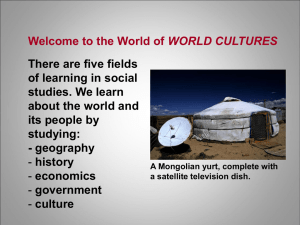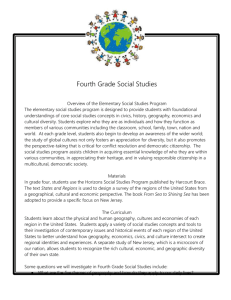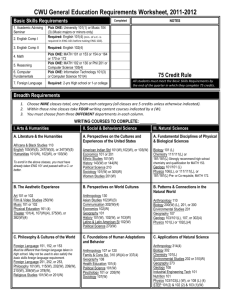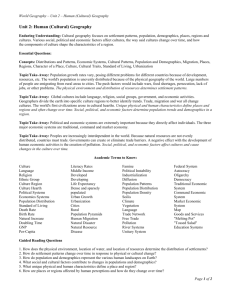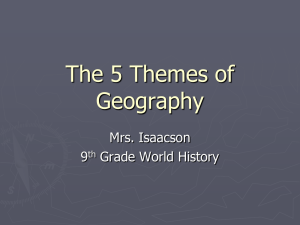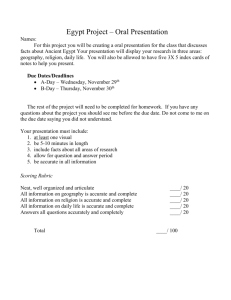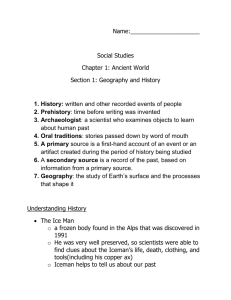Parent Summaries (Grades 6-8) - Baltimore County Public Schools
advertisement
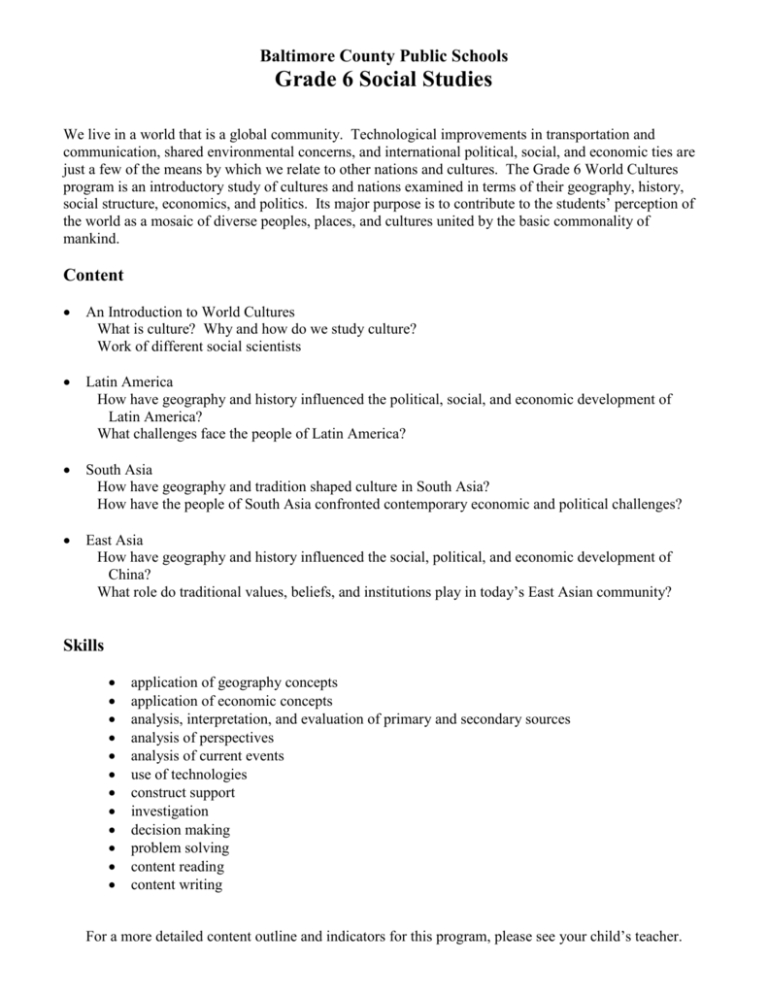
Baltimore County Public Schools Grade 6 Social Studies We live in a world that is a global community. Technological improvements in transportation and communication, shared environmental concerns, and international political, social, and economic ties are just a few of the means by which we relate to other nations and cultures. The Grade 6 World Cultures program is an introductory study of cultures and nations examined in terms of their geography, history, social structure, economics, and politics. Its major purpose is to contribute to the students’ perception of the world as a mosaic of diverse peoples, places, and cultures united by the basic commonality of mankind. Content An Introduction to World Cultures What is culture? Why and how do we study culture? Work of different social scientists Latin America How have geography and history influenced the political, social, and economic development of Latin America? What challenges face the people of Latin America? South Asia How have geography and tradition shaped culture in South Asia? How have the people of South Asia confronted contemporary economic and political challenges? East Asia How have geography and history influenced the social, political, and economic development of China? What role do traditional values, beliefs, and institutions play in today’s East Asian community? Skills application of geography concepts application of economic concepts analysis, interpretation, and evaluation of primary and secondary sources analysis of perspectives analysis of current events use of technologies construct support investigation decision making problem solving content reading content writing For a more detailed content outline and indicators for this program, please see your child’s teacher. Baltimore County Public Schools Grade 6 Gifted and Talented Social Studies We live in a world that is a global community. Technological improvements in transportation and communication, shared environmental concerns, and international ties are just a few of the means by which we relate to other nations and cultures. The Grade 6 Gifted and Talented Social Studies program uses the concept of anthropology to deepen and enrich the study of World Cultures. The program focuses on six main themes derived from the study of anthropology: context, biological and physiological needs, change over time, norms, environment, and perspective. Content: An Introduction to World Cultures What is culture? What is anthropology? How does anthropology serve as a framework to study and understand culture? Latin America How have geography and history influenced the political, social, and economic development in Latin America? What challenges face the people of Latin America? South Asia How have geography and tradition shaped culture in South Asia? How have the people of South Asia confronted contemporary economic and political challenges? East Asia How have geography and history influenced the social, political, and economic development of China? What role do traditional values, beliefs, and institutions play in today’s East Asian community? Skills: application of geographic concepts application of economic concepts analysis, interpretation, and evaluation of primary and secondary sources analysis of perspectives analysis of current events use of technology justification of position investigation decision making problem solving For a more detailed content outline and indicators for this program, please see your child’s teacher. Baltimore County Public Schools Grade 7 Social Studies We live in a world that is a global community. Technological improvements in transportation and communication, shared environmental concerns, and international political, social, and economic ties are just a few of the means by which we relate to other nations and cultures. The Grade 7 World Cultures program is the second year of a two-year study of cultures and nations examined in terms of their geography, history, social structure, economics, and politics. Opportunities for better understanding of one’s self and one’s own culture emerge through the development of a greater sensitivity toward other cultures. Content Introductory Why and how do we study culture? Africa How have geography and history influenced the development of a diverse Africa? What is the relationship between tradition and change in contemporary Africa? Middle East Why is the Middle East defined as a cultural crossroads? What challenges face the people of the Middle East? Europe Why is Europe the root of Western civilization? Central Eurasia How have geography and political traditions affected the people of Central Eurasia? What factors have contributed to the instability of Central Eurasia? Skills application of geography concepts application of economic concepts analysis, interpretation, and evaluation of primary and secondary sources analysis of perspectives analysis of current events use of technologies construct support investigation decision making problem solving content reading content writing For a more detailed content outline and indicators for this program, please see your child’s teacher. Baltimore County Public Schools Grade 7 Gifted and Talented Social Studies We live in a world that is a global community. Technological improvements in transportation and communication, shared environmental concerns, and international ties are just a few of the means by which we relate to other nations and cultures. The Grade 7 Gifted and Talented Social Studies program presents a chronological survey of events and development of regions of the world. Content: Identity and World Cultures Grade 7 GT How does the study of culture help me to understand my identity? Ancient Civilizations How did the development of ancient civilizations affect cultural identity? Judaism, Christianity, and Islam How does each of these religions contribute to the development of personal and cultural identity? Medieval Europe and the Islamic World How do the stages of development of European and Islamic civilization converge and diverge during the Middle Ages? Europe and the Modern Age How do new ideas shift perspectives about personal identity? Global Encounters How is cultural and personal identity affected by colonialism and nationalism? Regional Study: Central Eurasia How have geography and political traditions affected the people of Central Eurasia? What factors have contributed to instability in Central Eurasia? Regional Study: Africa What is the relationship between tradition and change in contemporary Africa? Regional Study: Middle East Why is the Middle East defined as a cultural crossroads? What challenges face the people of the Middle East? Skills: application of geographic concepts application of economic concepts analysis, interpretation, and evaluation of primary and secondary sources analysis of perspectives analysis of current events use of technology justification of position investigation decision making problem solving content writing For a more detailed content outline and indicators for this program, please see your child’s teacher. Baltimore County Public Schools Grade 8 Social Studies Social Studies 8 presents a chronological, narrative survey of the history of the United States from prehistoric America to 1877. The program is designed to encourage identification with the American people, their aspirations, their ideals, and their experiences at various points in time in our country’s history. Content Prehistoric America Unit concept of history geography of North America Native American cultures Europeans Colonize North America establishment of European colonies interactions between Europeans and Native Americans economic development of colonies Road to Independence—The American Revolution post-French and Indian War British policies events prior to the Revolution historical writings and documents key events during the American Revolution results of the Revolution Creating the American Republic Constitution, Bill of Rights administrations of Washington, Adams and Jefferson emerging political parties social transformations Nationalism and Expansion in America Jefferson’s domestic and foreign policy decisions Jackson’s presidency Westward expansion A Nation Divided—Sectionalism and Slavery early immigration and industrialization slavery sectionalism events leading to the Civil War The Civil War—America at War with Itself Northern and Southern strengths and weaknesses war aims and strategies Lincoln’s political decisions war time experiences of soldiers and civilians results of the war Transforming the Nation—Reconstruction conditions in the South Reconstruction policies Skills application of geography concepts application of economic concepts interpretation of primary and secondary sources analysis of perspectives analysis of current events use of technologies construct support investigation decision making problem solving content reading content writing For a more detailed content outline and indicators for this program, please see your child’s teacher. Baltimore County Public Schools Grade 8 Gifted and Talented Social Studies Gifted and Talented Social Studies 8 presents a chronological, narrative survey of United States history from prehistoric America to 1877. The program is designed to encourage independent, creative, and thorough study of topics and concepts in American history. Included in the Gifted and Talented American History program is a year-long Oral History Project. This project will guide students through an authentic oral history experience including background research on a topic, the interview process, and the critical analysis of the interview. Content: Prehistoric America: Its People and Geography o How did the indigenous people of North America utilize the natural environment to meet their basic needs? Europeans Colonize North America o How did social, political, and economic conditions affect the development of British colonies in North America? Oral History Project I: Focus Question Road to Independence: The American Revolution o How did disagreements over British policies result in the establishment of an independent United States? Oral History Project II: Research Creating the American Republic o How did the challenges faced by Americans following the Revolution impact the organization and policies of the new government? Nationalism and Expansion in America o How did the decisions made by the federal government result in the development and expansion of the nation? Oral History Project III: Interview A Nation Divided: Sectionalism and Slavery o How did differences in social, economic, and political conditions contribute to regional diversity? Oral History Project IV: Analysis The Civil War: America at War with Itself o How did events during the Civil War result in victory for the federal government? Transforming the Nation: Reconstruction o How did the federal government respond to condition in the South following the Civil War? Skills: analysis, interpretation, and evaluation of primary and secondary sources investigation decision making use of technology analysis of current events analysis of multiple perspectives synthesis of ideas and concepts justification of positions debate and discussion problem solving content writing For a more detailed content outline and indicators for this program, please see your child’s teacher.
